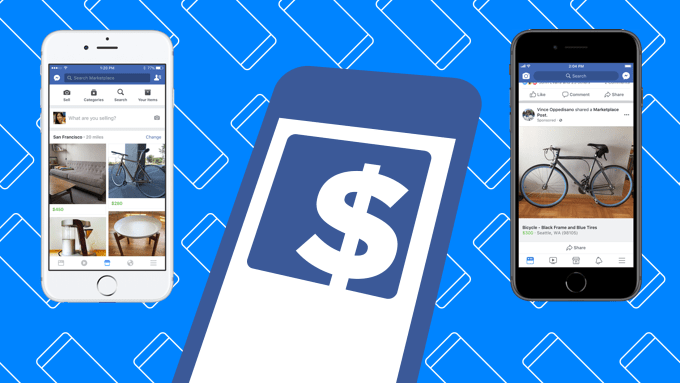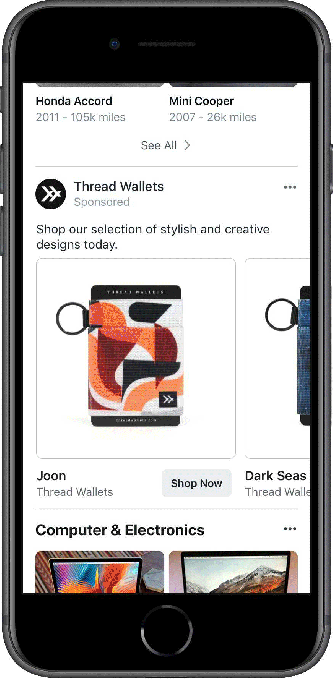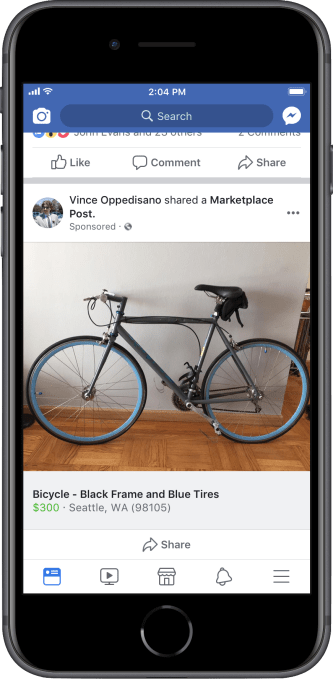

Twenty months after launching its Craigslist competitor, Marketplace, and relentlessly promoting it with placement in the main navigation bar, Facebook will start earning money off its classifieds section. Facebook today begins testing Marketplace ads in the U.S. that let average users pay to “Boost” their listing to more people through the News Feed. While they’re easy for novices, requiring buyers to only set a budget and how long the ads will run, there are no additional targeting options beyond being shown to age 18+ users in nearby ZIP codes.
Meanwhile, yesterday Facebook announced that it’s launching product ads from businesses that appear within Marketplace. After quietly opening in the U.S. in January and testing in Canada in May, Marketplace ads are now official, and can be bought in those two countries plus New Zealand and Australia. Businesses can extend their existing News Feed, video, Instagram, Messenger and other ad campaigns to Marketplace, and more types of objective-based campaigns will open to the classifieds section soon.

Facebook lets brands show ads within Marketplace
The Boost ads could be a big help if you need to rapidly liquidate your furniture before moving out, or if you’re trying to sell something big at a high price, like Marketplace’s new car, housing, jobs and home services offerings. Yet they seem inefficient, since the lack of targeting means your listing for men’s jewelry might show up to women, or your rock climbing gear ads could show up to senior citizens.

Facebook’s new Boost ads let average users pay to show their Marketplace listings to more people
But Facebook does tell me that ads will be auto-optimized for clicks, so when people start to click your ads, Facebook will show them to people of similar demographics. It will also immediately pause your ad campaign if you mark your item as sold. Boost ads get entered in alongside traditional bids in Facebook’s auction system, which then display what it predicts will be the most appealing ads.
“Many Marketplace sellers have told us that they want the ability to show a listing to more people in their local area, especially if they’re trying to sell it quickly,” Facebook product manager Harshit Agarwal tells TechCrunch. “We’re starting to test a simple way for sellers to boost their listings and help them find a buyer.” For comparison, Craigslist doesn’t run any ads, but charges sellers $5 to $10 for certain product listings for cars and brokered apartments.
One interesting quirk is that Facebook says it won’t allow boosting of listings of political products such as a Bernie Sanders for President t-shirt, as its political advertiser verification and labeling system only works with Pages and not individuals right now.
The Boost ads will only appear to a small percentage of U.S. users and Facebook says it’s too early to know if it will roll them out further. But as the company seems bent on swallowing up every other essential part of the internet, anything that makes Marketplace more useful to sellers and lucrative for the tech giant seems like a good bet for an official launch.
Together, the two formats could unlock new revenue streams for Facebook at a time when it’s starting to run out of ad inventory in the News Feed. The company either needs to open new surfaces like Marketplace to ads, or get people and businesses to pay more to fill its dwindling feed space if it wants to keep Wall Street happy.

